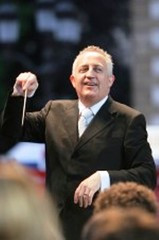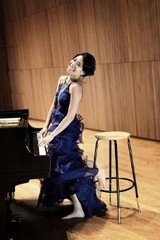|
Back
Night Around a Blazing Falla New York
David Geffen Hall, Lincoln Center
03/30/2016 - & March 31*, April 1, 2, 5, 2016
“Spanish Nights”
Jules Massenet: Ballet Music from Le Cid
Manuel De Falla: Noches en los jardines de Espana – El sombrero de tres picos
Joyce Yang (Pianist), Virginie Verrez (Mezzo-Soprano)
New York Philharmonic Orchestra, Bramwell Tovey (Conductor)

B. Tovey (© Courtesy of the artist
The title “Spanish Nights” doesn’t quite fit the New York Philharmonic concert for four evenings this week (as well as a Friday Massenet performance). The first selection was by a Frenchman, the second was an homage to the great 13th Century Moorish palace/fortress Al Hambra. But the third work, taking up the entire second half of the program, made up for the nominal errors of the first two works.
Conductor Bramwell Tovey, as always delightfully speechifyin’ (except for a meaningless pun about “trumped-up charges” which got the audience rolling in the aisles for reasons beyond my ken) is a dancing master for Spanish music. And his performance of Manuel de Falla’s The Three-Cornered Hat was not only vivaciously done, but showed that the usual suites from the ballet are sadly lacking. There are no sections of “pure balletic fluff” here. Falla never lacked for inspiration.
Actually, he had reversed the usual late 19th Century adoration of Iberian music. Where Debussy, Ravel, Tchaikovsky, Rimsky-Korsakov, Massenet and Bizet wrote perfectly decent music about Spain from their own homelands, De Falla left his backwater birthplace to write about Spain from Paris before spending his last years in Argentina.
(He had wanted to return to Spain, but the Fascist victory of Franco in 1939, and the assassination of many friends, made that impossible.)
And where the composers above used Spanish artifices and dances to great effect, Falla didn’t have to augment his music that way. Like Béla Bartók, his country had its own atmosphere which saturated every bar he wrote.
Yes, The Three-Cornered Hat finished with an Ivesian heterogeneity of Spanish dances, but the entire 40-minute ballet sings with the rhythms, colors, melodies and auras of Andalucia.
Much of the music is so gorgeous–The Neighbor’s Dance, The Miller’s Dance, the aforesaid finale–that it comes as a delightful shock to hear new music here, such as the clash and dissonance of the characters in the middle of Part Two (including a parody of Beethoven’s Fifth).
Mr. Tovey gave the entire ballet a volition and energy. His body movements were reflected in the reactions of the entire Philharmonic. No exaggerated Iberian moments here, for Falla, for all his leaning to the great Impressionists of Paris, was Spanish to the bone.
He was helped by French Metropolitan Opera mezzo-soprano Virginie Verrez. Nothing sweet here, her voice was hard, tough, dramatic and perfectly appropriate.
One can’t really have too much of Manuel de Falla, and the Phil did a nicely atmospheric rendition of Nights In The Gardens Of Spain. True enough, Falla never actually went to Granada and the great Moorish monument of Alhambra. But in Paris, he picked up a guidebook to the place, which gave him enough inspiration to write about it.
This time, the three movements weren’t a jolly Spanish-Chaucerian ballet like Three-Cornered Hat. The atmosphere was dark, mysterious, for these were gardens at dusk, the turrets of the castle in the moonglow.

J. Yang (© Courtesy of the artist)
Giving scintillating light, though, was pianist Joyce Yang, the piano an unending arc of colors and flashes, giving both radiance and depth to the orchestral pictures.
A shame that the concert had to begin with the last five sections of Massenet’s Cid. Nothing wrong with Massenet, and his tunes are familiar enough. But the Phil could have shown more imagination with, say, the Danzas fantasticas of Joaquín Turina. The composer might have been an ardent Franco-loving Fascist, but his music is still interesting and rarely played.
Back to Massenet. Mr. Tovey had a hard start with a lethargic Aragonaise and not much better Aubade. The last three pieces showed Massenet as a fluid, dextrous reasonably inspired composer.
His music sounds like a deftly manufactured product for the 19th Century Opéra Comique. Manuel de Falla had the inner inspiration that transcends both time and place.
Harry Rolnick
|